
On his blog this week, Mark Wallace shares why the Oscars is such a clear reminder of why we still have work to do to advance diversity and inclusion. Read more

On his blog this week, Mark Wallace shares why the Oscars is such a clear reminder of why we still have work to do to advance diversity and inclusion. Read more

As we celebrate the life of Dr. Martin Luther King, Mr. Wallace’s latest blog post reminds us that King was a champion for the equal rights of ALL Americans. Read more
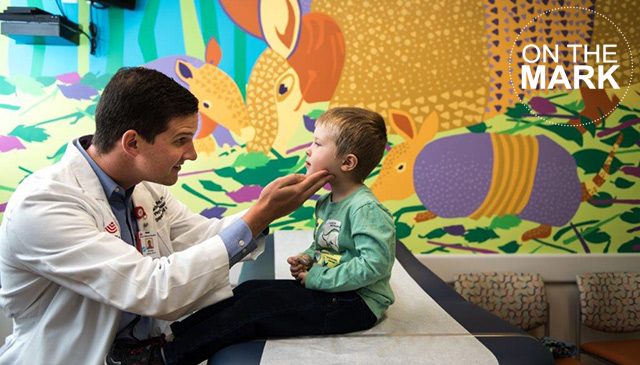
On his blog, Mr. Wallace reflects on some of his favorite accomplishments Texas Children’s and its One Amazing Team made in 2019. Read more
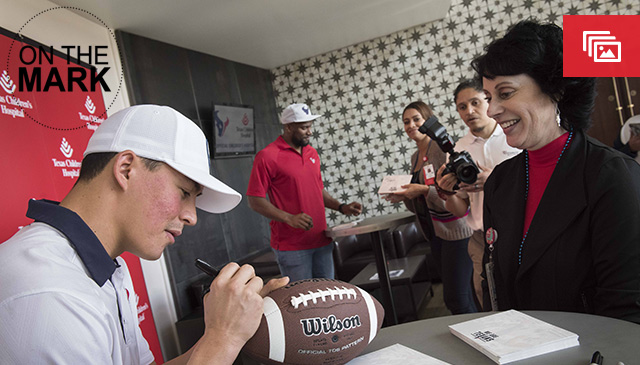
Another Leadership Maxim series has come to a close, highlighting amazing leadership throughout the organization through a series of guest blogs on On The Mark. To celebrate the finale, about 100 employees who participated in the series or commented on the blogs in the series attended a private event with the Houston Texans that included a behind-the-scenes tour of NRG Stadium, an autograph session with two Houston Texans football players and photos with Texans cheerleaders. The event was held on December 3. Read more
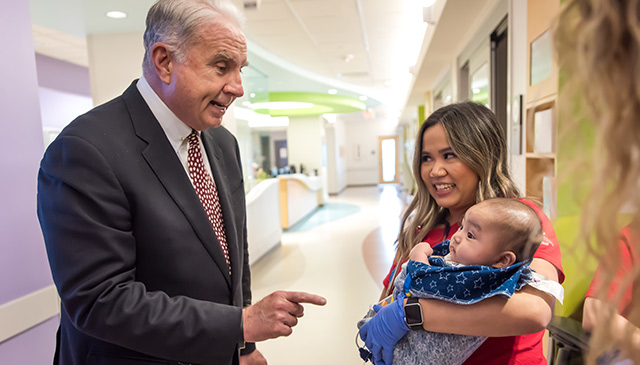
The following story was written by Jenny Deam and was published by the Houston Chronicle on November 26.
On Oct. 4, 1989, Mark A. Wallace, a bright, ambitious 36-year-old health care executive took the reins at Texas Children’s Hospital as one of the youngest CEOs at Texas Medical Center. Back then he had a vision to turn his hospital into a powerhouse to be reckoned with.
Three decades later, Wallace, now 66, is still CEO. Texas Children’s has grown on his watch into one of the largest and most comprehensive pediatric and women’s hospitals in the nation. Texas Inc. sat down with Wallace for a wide-ranging talk on the challenges facing health care today and into the future. His comments are edited for length.
Q: What made you decide on a career in medicine?
A: I was 16 years old and I was at a basketball camp in Edmond, Okla. I wandered over to the library at Central State University and I picked up some career books and manuals and they were talking about how Medicare and Medicaid has just been enacted and how medicine and health care were going to expand because there was going to be all of this additional reimbursement coming in. I’m sitting there in gym shorts and tube socks and white Converse tennis shoes and I’m thinking, well, this sounds like a great opportunity. I went home that night and I announced to my family at the dinner table, “Y’all I want to be a hospital administrator when I grow up.” That’s not what most 16-year-olds say, especially in 1969, but I have been focused on that ever since.
Q: Did you ever wish you had become a doctor?
A: Never. I was all about leadership and management and driving performance. I’ve always been fascinated with physicians and what they do clinically, what they do in research. I have tremendous affinity for physicians. And that has been one of the keys to my success: I like doctors. A lot. There’s a lot of health care CEOs that don’t.
Q: What has been the best change in medicine and health care in your career?
A: It’s definitely the attention, the resources and the focus on quality, service and safety. I spend more time talking about and listening to our team discuss quality and safety than I do about finance. And that was different 20 years ago. It used to be more about the balance sheet and the profit-and-loss statement.
Q: Safety is better now?
A: It’s improved dramatically. We have the ability now in real time to monitor safety events, where an egregious mistake was been made possibly resulting in death or serious harm to a patient. Last year in 2019 we had 4.6 million patient encounters at Texas Children’s. We had only five serious safety events and no deaths from them. Twenty years ago, we wouldn’t have been able to even count serious safety events to the degree we can today. And even with a lower denominator, because we weren’t as big back then, the number of mistakes would have been much, much higher.
Q: What is worse in health care?
A: Not here at Texas Children’s, but in medicine in general, I see many people have less personal contact with their colleagues and sometimes even with patients and family members. Because of the development of technology, there is less face time. People are using their devices and texts and email in order to communicate. This is a challenge for the industry throughout the United States and throughout the world. There’s no substitute for face time. That personal touch is so important in medicine. I don’t think that’s being old-fashioned. I think that’s the right way to do it.
Q: How does your hospital deal with the state’s high uninsured rate?
A: To us, and to me, is it is a major problem in health care in the United States, especially in Texas and in Houston. But we run toward that problem, we embrace the uninsured in our community and we want to take care of them regardless of their ability to pay. Twenty years ago we started community care centers. We have seven now throughout the Greater Houston area. We have nurses and social workers and case workers who work with these children when they come in to sit down with the moms and fill out the forms and see if they are eligible for Medicaid or Children’s Health Insurance Program (CHIP) or a commercial plan. That’s the big problem in Texas. So many of these kids are eligible but they’re not enrolled. Texas has got to do better than this. This is an embarrassment for our great state.
Q: Why is having children insured important?
A: When a child has health insurance, they are three times as likely to be taken to see a pediatrician or to go to a hospital. If a child doesn’t have access to health care they lag behind, they miss school and they get sicker and their state of health declines. We end up taking care of them in the emergency centers where their problem is much more serious and much more expensive to treat.
Q: Is this personal for you?
A: Many years ago, I thought, before I retire I want to work in a system that has universal access and coverage for all children. I thought that would be done by now.
Q: Are you seeing any fallout in health care from the White House’s policies on immigration, even among citizen children of immigrant parents?
A: Yes. There’s the Texas Children’s Health Plan and we have over 400,000 members. The majority are children covered by Medicaid and CHIP. We’ve seen in the last year about a 4 percent decline in our membership and it’s because of exactly that – parents are not taking their child to get enrolled because they are fearful of being deported. It’s incredibly unfortunate and it’s affecting children and their health. That is a reality in our society.
Q: What can you as a hospital administrator do?
A: I think it’s talking with people. It’s talking with our legislative leaders.
Q: What’s been the reception?
A: It’s falling on deaf ears.
Q: How do you prepare for the large-scale change that could be coming in payment methods?
A: We study the proposals. There will be a change, whether its 2020 or 2024, whether it’s Medicare-for-All or something else. We’ve been advocating for universal access and coverage my entire career. We believe that it is a right for health care in the United States of America for our citizens. We don’t know what’s coming down the pike, but we’ve been hearing about single-payer systems since the 1960s with Sen. (Edward) Kennedy. It’s been around for 50 years, but we’ve not made very much progress. Now that conversation is more mainstream. How do we get ready? Regardless of the form or the structure of the payment methodology we know who we are, and we know what our mission is so we’re going to stick to that mission.
Q: How do you re-arrange your financial structure to be ready?
A: You have to be very efficient with the deployment of your resources. But it really is care coordination, finding that most effective way and venue to take care of a child. That’s the key. Reimbursement today is as good as it’s ever going to get. Lean and mean and being more effective and more efficient those are things we work on every single day.
Q: Any plans for a merger or acquisition with another hospital?
A: No.
Q: Any retirement plans on the horizon?
A. Everyone asks that. When you get to be 66 and you’ve been the CEO for 30 years you can’t be afraid of that question, and I’m not. I feel great, I still have a very high energy level, I still feel very inspired. So right now, I don’t have any plans for retirement. But one of the most important things that a board and a CEO can do is have a really strong leadership development and succession plan. Several years ago, I made a deal with God that He would tell me when it was time for me to retire.
Q: God has not whispered in your ear?
A: Not yet. But I try to always be available.
Mark A. Wallace, CEO of Texas Children’s Hospital
EDUCATION: B.S. from Oklahoma Baptist University and MHA from Washington University in St. Louis
FAMILY: Wife – Shannon; two children; seven grandchildren.
SOMETHING MOST PEOPLE DON’T KNOW ABOUT ME: How much I like to sing and tell jokes.
FAVORITE QUOTE: “The best way to predict the future is to create it.” – Peter Drucker.
FAVORITE BOOK (or books): “The Art of Possibility” by Rosamund Stone Zander with Benjamin Zander
PERSON I WOULD LOVE TO HAVE DINNER WITH: Theodore Roosevelt
SOMETHING I DON’T TALK ABOUT MUCH BUT GUIDES ME: My faith and belief in destiny.
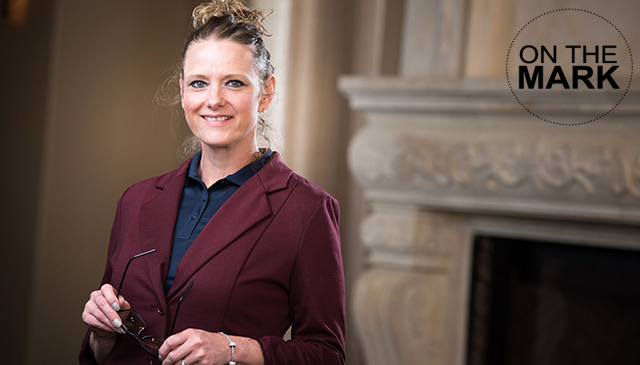
On his blog, Mark Wallace continues his Leadership Maxim series with his fourth guest blogger, Kristi Lemmert, who writes about Maxim No. 4: We all should have our own definition of leadership.
By commenting on Lemmert’s blog – and the next blog in the Leadership Maxim series – you can secure a chance to score a spot at a Houston Texans event.
Throughout November, the Corporate Communications team will randomly select 100 people from the comments to attend a private event with the Houston Texans, including a behind-the-scenes tour of NRG Stadium, an autograph session with two Houston Texans football players and photos with Texans cheerleaders. The event will be held on Tuesday, December 3. Read more
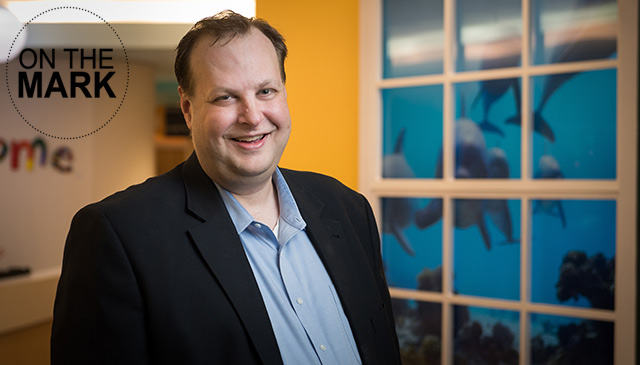
On his blog, Mark Wallace continues his Leadership Maxim series with his third guest blogger, Gary Bradshaw, who writes about Maxim No. 3: We lead in our professional lives and in our personal lives. By commenting on Bradshaw’s blog – and the next two blog posts in the Leadership Maxim series – you can score a spot at a Houston Texans event! Throughout November, the Corporate Communications team will randomly select 100 people from the comments to attend a private event with the Houston Texans, including a behind-the-scenes tour of NRG Stadium, an autograph session with two Houston Texans football players and photos with Texans cheerleaders. The event will be held on Tuesday, December 3. Read more